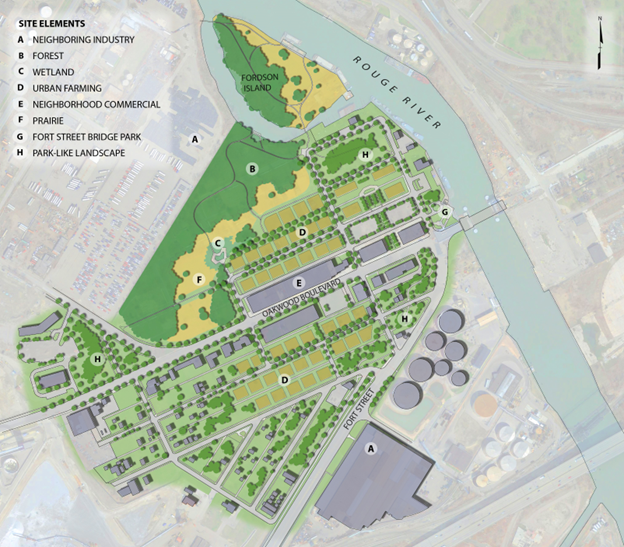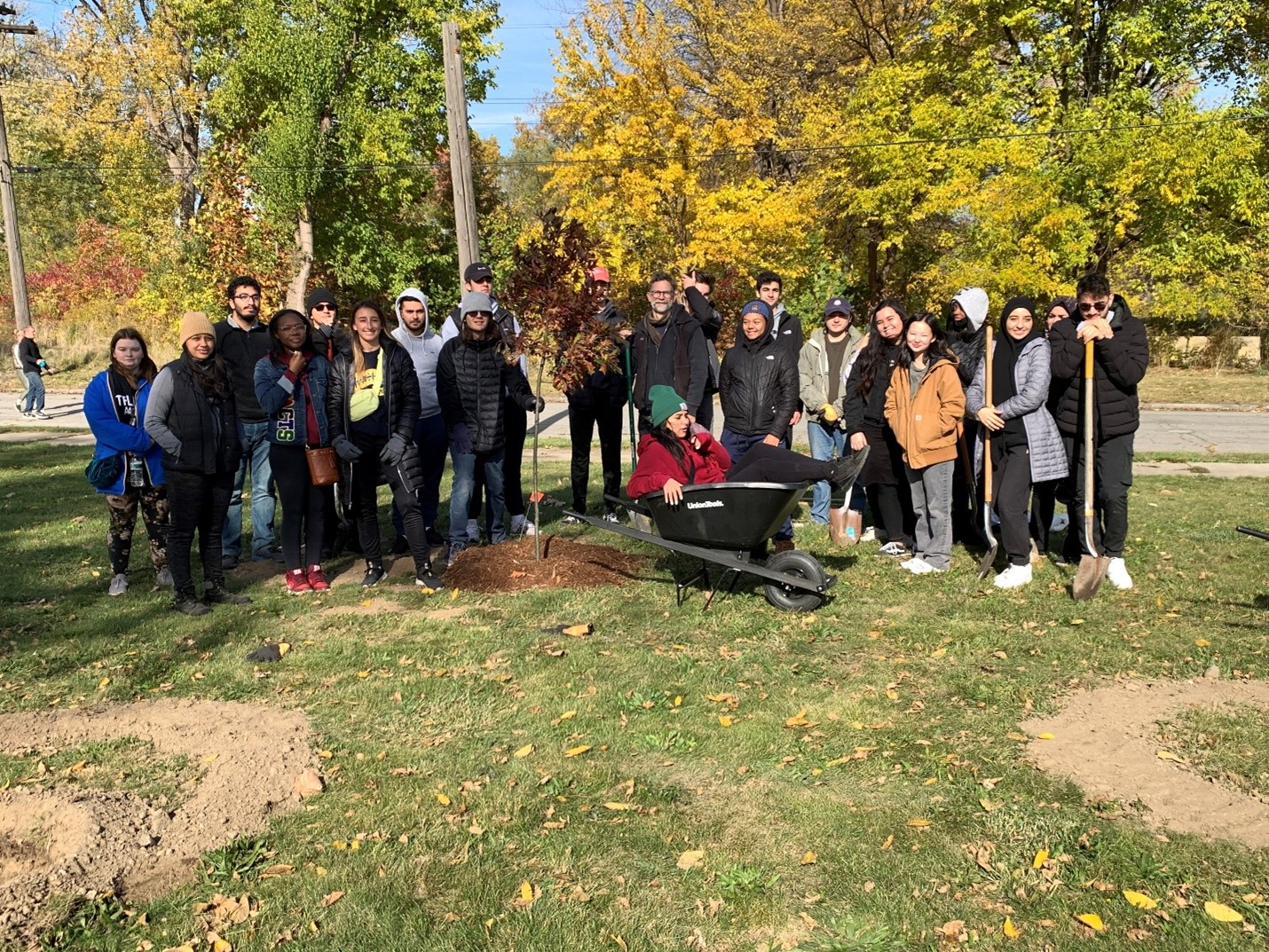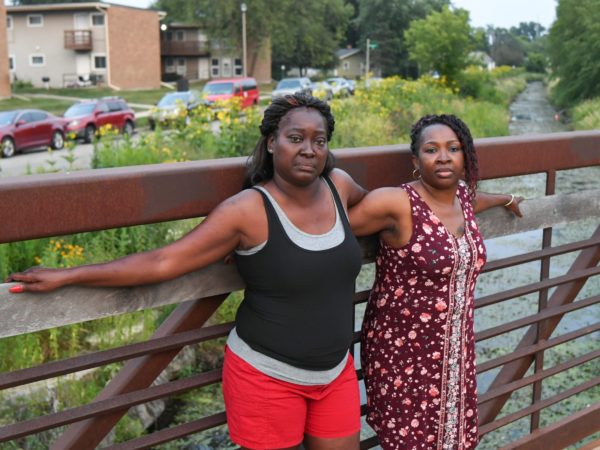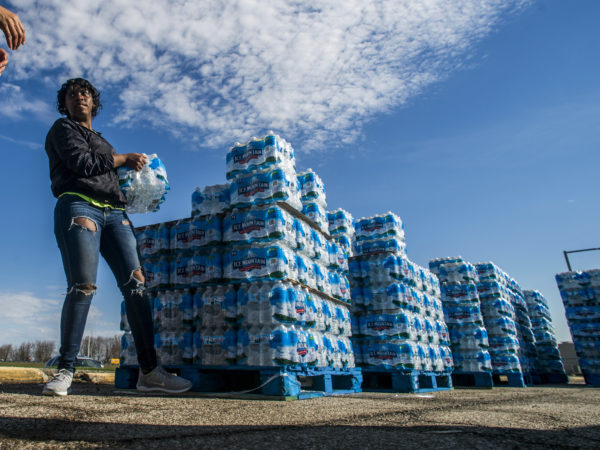
Great Lakes Moment is a monthly column written by Great Lakes Now Contributor John Hartig. Publishing the author’s views and assertions does not represent endorsement by Great Lakes Now or Detroit Public Television.
Southwest Detroit has long been known for its heavy industry. In recent years, the Boynton and Oakwood Heights neighborhoods have teamed up with Marathon Petroleum Corporation’s Detroit refinery to strengthen and revitalize these communities, including a plan to create some much-needed green space.
Combined, Boynton and Oakwood Heights occupy 2.8 square miles within the 48217 zip code. With a population of about 9,000, these neighborhoods are the only ones in Detroit located south of the Rouge River and are bisected by the I-75 freeway.
Oakwood Heights is the smaller of the two and borders Melvindale to the west and the city of Dearborn to the northwest. Boynton is bordered by Dearborn and Melvindale to the north and west, River Rouge and Ecorse to the East, and Lincoln Park to the south. They also are bounded by major industries, like Marathon, which refines up to 140,000 barrels of crude oil per day, as well as Corby Energy Services, which provides utility and infrastructure services.
On the northern edge of Boynton sits the Oakwood pumping station and combined sewer overflow control facility that pumps, stores, and disinfects stormwater and wastewater during heavy rains. A short distance northeast is the Detroit regional water resource recovery facility – the largest single-site wastewater treatment plant in the United States.
Marathon’s interest in creating a green buffer near its refinery combined with neighborhood interest in expanding greenspace led to a proposal for a 100-acre Marathon Gardens. It will include an urban forest, wetland and prairie habitats, urban agriculture, and park-like space with public amenities like trails and picnic areas, and will improve public access to the Rouge River. Marathon jump-started the creation of this green oasis in 2011 with a property purchase program to clean up blighted areas and provide opportunities for residents to sell their properties and move elsewhere. All land acquired through this program is now part of Marathon Gardens, creating quality greenspace with significant environmental, social, and economic benefits to surrounding neighborhoods.
“Marathon Petroleum Company LP is committed to working with community partners and state agencies like the Michigan Department of Natural Resources and Michigan Department of Transportation to realize the vision of Marathon Gardens that will become part of the community fabric of the Boynton and Oakwood Heights neighborhoods,” said Kevin Lepak, advanced environmental specialist at Marathon in Detroit. “Giving back is important to Marathon because it is one of our core values to be a good neighbor to our surrounding community and it is something our employees really care about.”
Marathon Gardens’ location is important. It’s at the intersection of regional greenways like the Joe Louis Greenway, Downriver Linked Greenways, the Iron-Belle Trail, and The Great Lakes Way in the heart of industrial Detroit. Guiding the creation of Marathon Gardens is a master plan that addresses stormwater runoff, oversees natural areas and other greenspace development, and establishes outdoor recreational amenities. However, this oasis remains a work in progress.
With help from community and employee volunteers, the Marathon Detroit refinery has planted hundreds of native trees like sycamore and burr oak that soak up rainwater and reduce stormwater runoff into the Rouge River. Marathon and its partners have also created habitats for cavity-nesting birds, turtles, and even bats.
The gardens have been recognized and certified at the highest level by the Wildlife Habitat Council for habitat conservation on corporate lands through partnerships and education. Marathon continues to collaborate with Wildlife Habitat Council staff and neighborhood partners to expand and maintain the gardens’ habitats via planting and stewardship events.

Tree planning in Marathon Gardens. (Photo Credit: Marathon Petroleum Corporation)
Another part of this green oasis is the Fort Street Bridge Park, which opened in 2020 to commemorate history and provide much-needed public access to the Rouge River. It is a good example of place-making that creates public spaces to improve urban vitality and promote people’s health, happiness, and well-being. The Fort Rouge Gateway Coalition, Downriver Delta Community Development Corporation (which promotes regional collaboration for economic development, quality of life, and social equity in the Downriver Area), Marathon, MotorCities National Heritage Area, Friends of the Rouge, and many other partners came together to design, fund, and construct this unique southwest Detroit destination.
This park commemorates the Ford Hunger March. On March 7, 1932, more than 3,000 people marched from southwest Detroit to Dearborn’s Ford Rouge plant to demand jobs, better work conditions, and relief for laid-off workers. A confrontation with police officers and firefighters at the Fort Street bridge failed to stop the march. When the protesters reached gate four at the Rouge plant, police officers and Ford security personnel attacked them, firing several hundred shots and killing four marchers. A fifth died later of injuries.
Other amenities of Fort Street Bridge Park include a gathering plaza with a sculpture that features salvaged parts for the original bridge, seating and porous pavement, an interactive stormwater management demonstration with fountains and rain garden, native plantings, habitat enhancements, and interpretive signage featuring the Rouge River’s story of degradation and restoration. A kayak launch and rest area for the Lower Rouge River Water Trail are planned for the next phase.
On the edge of the Oakwood Heights neighborhood in the Rouge River sits an eight-acre uninhabited island called Fordson Island. Following a $150,000 marine debris removal project in 2010 that removed sunken boats, barges, and debris, partners are now exploring how this island could be transformed into a community park for passive recreation.
Anchoring the Boynton neighborhood is the Kemeny Recreation Center and Park, which went through a $9.5 million renovation in 2019, including a $1.4 million grant from Marathon. The RollerCade, a family-owned skate center, in operation since 1955 and still crowded today with lessons, free skating, and birthday party celebrations, is also a local landmark. Coupled with Marathon Gardens and its accompanying trails, they will strengthen revitalization efforts in these two neighborhoods.
The Downriver Delta Community Development Corporation continues to work with Marathon and other partners to explore ways to better connect the Boynton-Oakwood Heights neighborhoods and Marathon Gardens with the regional trail system. The next steps in strengthening these connections include:
- Providing a safe off-road trail along Fort Street in Marathon Gardens
- Greening trail connections to I-75 pedestrian crossings that reconnect the two neighborhoods
- Increasing tree plantings along the I-75 freeway as a buffer
- Enhancing safe trail routes by exploring how vacant land might be incorporated into the regional trail system
“The Boynton and Oakwood Heights communities once were made up of trading posts and ribbon farms, followed by the industrial age,” said Wanda Lowe-Anderson, community organizer and member of the Downriver Delta Community Development Corporation’s board of directors. “Today, although these communities are located near industry, I believe a rebirth is taking place through the creation of green buffering solutions such as Marathon Gardens, parks, and trails, all reducing the environmental impact of industry while creating more healthy recreational opportunities for our residents.”
John Hartig is a board member at the Detroit Riverfront Conservancy. He serves as a Visiting Scholar at the University of Windsor’s Great Lakes Institute for Environmental Research and has written numerous books and publications on the environment and the Great Lakes. Hartig also helped create the Detroit River International Wildlife Refuge, where he worked for 14 years as the refuge manager.
Catch more news at Great Lakes Now:
Great Lakes Moment: A Detroit perspective on the 50th anniversary of the Endangered Species Act
Great Lakes Moment: Detroit’s new Ralph Wilson Park will provide habitats for a healthy ecosystem
Featured image: Marathon Gardens’ vision plan, southwest Detroit. (Photo Credit: Marathon Petroleum Corporation)
1 Comment
-
Great place to wet a worm for Michigan Master Angler fish.




